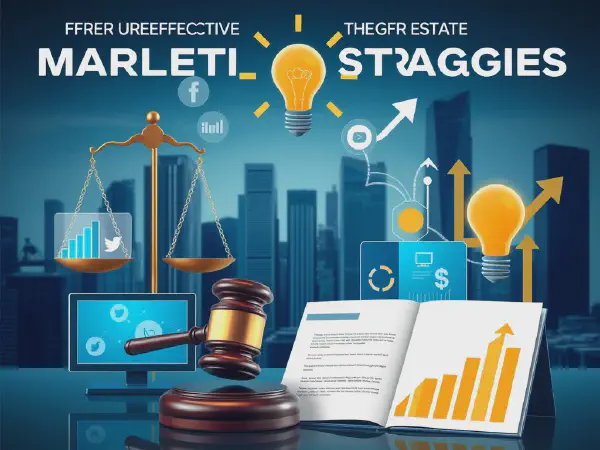Effective Real Estate Lawyer Marketing Strategies for Success

Real Estate Lawyer Marketing: Strategies for Success
Real Estate Lawyer Marketing is a critical aspect for legal professionals looking to attract clients in the competitive real estate sector. With the vast number of real estate transactions taking place each year, real estate lawyers must implement effective marketing strategies to stand out and offer their services successfully. From leveraging digital marketing techniques to establishing a solid network, a comprehensive approach is necessary for success in this field.
Transform your firm’s growth potential by leveraging insights from Real Law Digital real estate law firm marketing.
To navigate the complexities of Real Estate Lawyer Marketing, legal practitioners need to focus on creating a robust online presence and enhancing their visibility among potential clients. By utilizing various digital marketing tactics such as SEO, social media engagement, and content marketing, lawyers can not only increase their reach but also build trust with potential clients who are searching for legal assistance in real estate matters.
Another critical element of Real Estate Lawyer Marketing is networking and generating referrals. Building relationships with real estate agents, attending local events, and creating referral programs can significantly boost a lawyer's reputation and client base. By fostering strong connections within the real estate community, lawyers can position themselves as trusted partners to real estate professionals and potential clients alike.
The branding and positioning of a real estate lawyer also play a vital role in their marketing strategy. Developing a unique value proposition, creating professional marketing materials, and showcasing expertise in real estate law can enhance a lawyer's credibility and attract clients. Moreover, utilizing testimonials and case studies can further solidify their reputation in the industry.
Elevate your client outreach with unique approaches from Real Law Digital real estate attorney marketing for exceptional results.
Paid advertising techniques represent another powerful avenue for Real Estate Lawyer Marketing. Through platforms like Google Ads, Facebook, and LinkedIn, real estate lawyers can target specific audiences and drive traffic to their services. Crafting well-structured advertising campaigns with clear messaging can lead to increased client inquiries and successful conversions.
For innovative strategies in online visibility, check out Real Law Digital real estate law firm seo to enhance your practice.
Digital Marketing Strategies
Utilizing SEO for real estate lawyers involves optimizing a website's content with relevant keywords such as 'real estate lawyer' or 'property attorney.' This search engine optimization helps improve visibility on search engines, allowing potential clients to find legal services more easily. It's essential to implement local SEO strategies by including the geographic area serviced to attract local clients.
Leveraging social media platforms for client engagement is crucial for real estate lawyers looking to connect with potential clients. Sharing informative content, success stories, and legal insights on platforms like Facebook, Twitter, and Instagram can help create a community and encourage interactions. Regular engagement and timely responses can also foster relationships and build trust.
Discover why Real Law Digital is the go-to resource for cutting-edge legal marketing strategies.
Content marketing techniques for legal blogs are significant in positioning a real estate lawyer as an industry expert. Writing informative articles that address common questions or concerns related to real estate law can attract organic traffic to the lawyer's website. Incorporating law-related topics with practical advice can also establish credibility and encourage readers to seek legal services.
Email marketing campaigns tailored for real estate clients can nurture leads and keep potential clients informed. Sending newsletters with updates on local real estate markets, legal tips, and promotions can help maintain a connection with leads. Personalized emails can enhance client relationships and encourage them to return for legal services when needed.
Website optimization for lead generation includes creating a user-friendly interface, fast loading times, and clear calls-to-action. Ensuring that potential clients can easily navigate the site and find contact information is crucial for converting visitors into leads. Incorporating lead capture forms and offering free resources can further enhance engagement and encourage inquiries.
Networking and Referrals
Building relationships with real estate agents is essential for generating referrals. Real estate agents often encounter clients in need of legal assistance during transactions. Collaborating with agents through mutual referrals can create a win-win situation, establishing a network of trusted professionals who can recommend each other's services.
Participating in local real estate events allows lawyers to meet potential clients and real estate professionals in person. Attending open houses, industry seminars, or local real estate expos can provide networking opportunities, create visibility within the community, and facilitate connections that may lead to referrals.
Creating referral programs for past clients can incentivize satisfied customers to recommend services to their friends and family. Offering benefits such as discounts on future legal services can encourage clients to spread the word about their positive experiences, driving more business through referrals.
Joining real estate associations and networks can enhance a lawyer's visibility and credibility. Being active in professional organizations provides opportunities to connect with real estate agents, brokers, and other lawyers, fostering collaboration and referral opportunities among members.
Leveraging professional connections for leads involves maintaining relationships with existing clients and contacts. Regularly following up and engaging with this network can yield referrals and create additional opportunities for business growth, as personal recommendations carry weight in the decision-making process.
Branding and Positioning
Defining a unique value proposition for real estate services helps lawyers communicate what sets them apart from competitors. Clearly stating the advantages of choosing a specific lawyer, such as specialized expertise or personalized service, can resonate with potential clients and encourage them to reach out for assistance.
Developing a professional brand identity involves creating a cohesive image across all marketing materials, including logos, color schemes, and messaging. A strong brand identity can evoke trust and professionalism, making clients more likely to choose a lawyer for their real estate needs.
Creating informative brochures and marketing materials that highlight legal services and areas of expertise can enhance brand visibility. Distributing these materials during networking events, seminars, or through real estate offices can increase awareness and provide potential clients with valuable information about services offered.
Positioning as an expert in real estate law entails showcasing deep knowledge and experience in the field. This can be achieved by offering free consultations, writing articles for legal publications, or speaking at industry events. Public visibility as an expert can encourage potential clients to seek legal help when faced with real estate issues.
Utilizing client testimonials for credibility can influence potential clients' decision-making processes. Displaying positive reviews and successful case outcomes on websites and promotional materials can significantly enhance a lawyer's reputation and instill confidence in prospective clients.
Paid Advertising Techniques
Google Ads strategies for targeting real estate clients involve creating specific ad campaigns that focus on relevant keywords. Utilizing geo-targeting and demographics can enhance the effectiveness of these ads, ensuring they reach potential clients actively searching for real estate legal services.
Facebook and Instagram advertising for law practices can visually showcase services through eye-catching graphics and concise messaging. These platforms provide advanced targeting options, allowing lawyers to reach specific audiences based on location, demographics, and interests, ensuring a more effective ad spend.
Using LinkedIn for B2B marketing in real estate allows lawyers to connect with industry professionals and build relationships. Sharing expertise, participating in discussions, and engaging with real estate-related content can position a lawyer as a valuable resource for businesses looking for legal assistance.
Retargeting ads to reach potential clients involves displaying ads to individuals who have previously visited a lawyer's website. This technique keeps the brand in the forefront of potential clients' minds and encourages them to return and consider the services offered more seriously.
Budgeting for effective legal advertising campaigns is crucial to maximize the return on investment. Lawyers should analyze and allocate their advertising budget to various platforms based on their target audiences and monitor campaign performance to ensure that funds are spent efficiently and effectively.
Client Engagement and Retention
Developing client loyalty programs can enhance client retention and satisfaction. Offering incentives such as discounts on future services or exclusive resources can make clients feel valued and encourage them to return for assistance in future real estate transactions.
Utilizing feedback for service improvement is vital for maintaining high-quality legal services. Regularly interviewing clients about their experiences and implementing changes based on that feedback can improve satisfaction and encourage positive referrals.
Personalized communication strategies with clients create a positive experience and strengthen relationships. Tailoring communication based on individual preferences and maintaining a consistent follow-up schedule can enhance client retention and loyalty.
Hosting informational webinars on real estate issues positions lawyers as knowledgeable authorities in their field. By providing valuable insights on pressing real estate topics, lawyers can attract potential clients while demonstrating their expertise and willingness to educate.
Creating valuable resources for real estate buyers and sellers further reinforces a lawyer's credibility. Offering guides, checklists, and FAQs on legal matters related to real estate transactions can appeal to clients seeking information, increasing the likelihood of engaging legal services.
